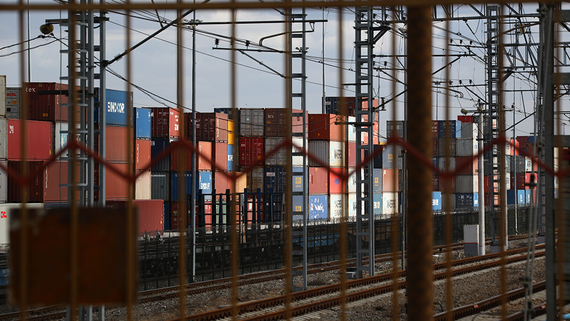Russian Railways improves container transportation forecast for 2023
[ad_1]

Russian Railways plans to transport 7 million TEU (similar to a 20-foot container) through its network in 2023. This was announced on May 30 at the conference “Containers 2023. Market Foresight” by the company’s CEO Oleg Belozerov.
Alexei Shilo, Deputy Director General of Russian Railways, added that this year’s target could be exceeded, but did not specify how much. In 2022, container transportation through the Russian Railways network amounted to 6.5 million TEU. The monopoly’s previous forecast for this year was 6.8 million TEU.
Operators also presented similar estimates on the growth of container traffic by rail this year at the conference. Thus, the forecast of the president of TransContainer (part of the Delo group) Vitaly Evdokimenko is 8.7% (7.1 million TEU). Vice President for Linear Logistics Division Fesco German Maslov estimates the potential growth of container traffic at 6-7% (6.9-7 million TEU). At the same time, the level of containerization of goods on the Russian Railways network, according to Shilo’s estimates, is now 5.5%.
As Belozerov noted, imports, exports and domestic transportation are growing at a faster pace. According to Evdokimenko, export-import traffic will become the main drivers of growth in container loading, while transit traffic will fall by 6%. Maslov stressed that a certain cooling is now observed on the market, and a seasonal increase in traffic is expected from the beginning of summer.
In January-April 2023, 2.3 million loaded and empty containers (in 20-foot equivalent) were transported through the Russian Railways network in all types of traffic, according to the company’s data. This is 8.5% more than in the same period in 2022. Chemical and mineral fertilizer shipments grew the most, more than tripling to 86,400 TEU. The transportation of potatoes, vegetables, fruits, as well as cars and components increased by one and a half times – up to 6,800 TEU and 127,200 TEU, respectively. Domestic transportation of containerized cargo amounted to 911,200 TEU, showing an increase of almost 9% compared to January-April 2022.
In general, loading on the Russian Railways network over the four months of 2023 increased by a symbolic 0.2% compared to the same period last year and amounted to 411 million tons. As Shilo noted on the sidelines of the conference, Russian Railways recorded a 2% increase in loading in May, In June, this indicator is also expected to increase (his words are quoted by Interfax). In April, a top manager said that loading volumes in 2023 would not be lower than last year. In 2022, loading on the Russian Railways network decreased by 3.8% to 1.23 billion tons. This was the worst result in terms of freight traffic dynamics over the past 13 years.
Pavel Ivankin, President of the Transportation and Infrastructure Research Center, believes that the transportation of 7 million TEU is an ambitious task. But Ivankin does not exclude the possibility of its implementation. According to the expert, an increase in container loading will occur due to domestic transportation, as well as due to an increase in import transportation in the III-IV quarter of 2023. However, Ivankin continued, an increase in containerization may occur due to “switching cargo from wagon to container”, which is not will affect the increase in loading on the network as a whole.
Alexander Slobodyanik, Deputy Head of the IPEM Railway Research Department, believes that by the end of 2023, container traffic can set a historical record and exceed 7 million TEU. According to the expert, the growth of this indicator will be facilitated by an increase in domestic transportation and imports, including through an increase in trade relations with China. According to IPEM, imports of only containers with cars and components from China in January-March increased by 75%.
Matvei Taits, senior analyst at Sinara investment bank, notes that containerization is growing due to the replacement of import volumes that used to come by road. In his opinion, the increase in container traffic will grow due to the import of machinery and equipment.
Dmitry Baranov, the leading expert of Finam Management, added that in addition to industrial goods, consumer goods, including food products, can also provide growth. “It is also possible to increase the transportation of other types of cargo in specialized containers, for example, various liquids in tank containers,” Baranov added.
[ad_2]
Source link





